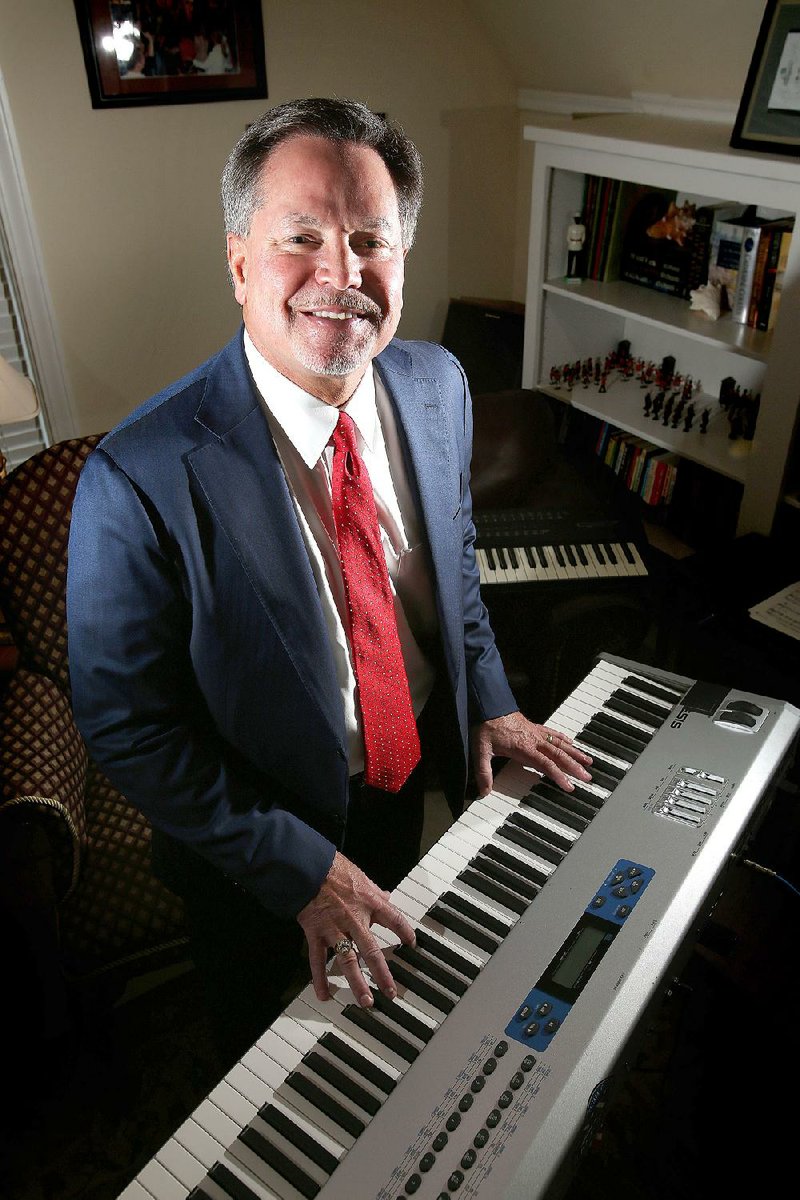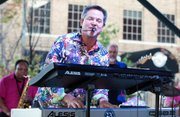The lifespan of local rock bands is usually measured in months or years, not decades. Egos, lousy gigs, day jobs and the tug of other responsibilities eventually trump the thrill musicians find in playing together.
Then there are The Rockets, who have spent nearly 25 years performing for some of Arkansas’ biggest parties, fundraisers and other events — including a whopping 260 wedding receptions. Piloting the group for most of that time has been Phillip Wallace, whose enthusiasm for music and life in general seems contagious enough to drive any undertaking forward.
SELF PORTRAIT
Phillip Wallace
• DATE AND PLACE OF BIRTH: April 12, 1960, Newport.
• FAVORITE PERFORMER: Sir Paul McCartney.
• GROWING UP I THOUGHT I WOULD: Travel the world.
• THE ACTOR WHO WOULD PLAY ME IN A MOVIE: Sean Connery.
• I RELAX BY: Watching baseball or reading military history.
• LAST VACATION WAS TO: Great Britain.
• MY FAMILY THINKS I'M: Loyal.
• MY MOST MEMORIAL GIG: Minneapolis for a national health care convention or the private party for the opening of the Clinton Presidential Center.
• GUESTS AT FANTASY DINNER PARTY: Winston Churchill; Queen Elizabeth II; Paul McCartney; Robert E. Lee; Clarence Darrow; Margaret Thatcher; and my father. He would find a way to hijack the discussion.
• ONE WORD TO DESCRIBE ME: Relentless.
“When I think of The Rockets, I think of Phillip,” event planner Shelia Vaught says. “He has made The Rockets what they are.”
Or were. This month, in what may come as a shock to brides across the state, The Rockets played what Wallace says was their last gig, a huge wedding reception for a well-known Arkansas family that was also “a going-away party” for the band.
Then again, he has changed his mind before.
Like most of the band’s members, the 58-year-old Wallace is a part-time musician, with a full-time job recruiting physicians for Baptist Health. He grew up in Newport, where his father, Jug, ran an insurance agency. More importantly, his son says, “he’d had a big band since he was in high school, in 1945, called The Townsmen. I grew up with big band music — Jimmy Dorsey, Count Basie.”
Jug Wallace played trumpet — also Phillip’s first instrument — and his best friend played trombone in the group. Both their wives also occasionally sang. The Townsmen played shows around the state until members were in their 80s. Jug Wallace died on the day The Townsmen were scheduled to play a Valentine’s Day show. Phillip’s mother, Jeanne, now lives in Little Rock.
Forced to choose between band and sports in school, Wallace opted for the football, baseball, track and tennis teams. But he remained passionate about music. “I drove my parents mad with The Beatles and the Revolver album. I literally wore it out and had to get another one.”
He’d taken piano lessons and continued playing that instrument for parties at the Sigma Chi fraternity house at the University of Arkansas, Fayetteville, where he majored in political science and history.
Wallace went on to UA law school but left before graduating to take a job with the University of Arkansas at Pine Bluff as an affirmative action officer. He left that for a post with Baptist Health, starting as a recruiter for Baptist Health College Little Rock, then moved into the position he has held ever since for Baptist Health. Wallace finds physicians to work in nine hospitals and dozens of clinics that Baptist owns or manages.
“He does an excellent job with that important role,” Herren Hickingbotham, a Little Rock businessman and Baptist board member, said. “It’s getting more and more difficult to find good doctors to fill the amount of available positions. With his personality, he just makes people feel comfortable and relates to them.”
Like seemingly everybody who knows Wallace, Hickingbotham considers him a personal friend, calling himself a “huge fan of The Rockets.”
Wallace says he and his partner in network development, Claire Pittman, have recruited about 400 physicians to the Baptist system. While doctors are more mobile than ever, Arkansas can still be a hard sell for some. He pitches the state as “a hidden gem. People might have had an inclination to have a slanted view of the South years ago. That’s just not so today. This is a wonderful state — it’s very embracing — and Baptist is a wonderful system to work for.”
As for his recruiting style, Wallace says, “I’m relentless. I love our state. I want us to have the things to take care of the needs of the people of Arkansas.”
TICKLING THE IVORIES
The Rockets were formed in late 1994 by Johnny Roberts, a Little Rock advertising executive who’d fronted numerous bands since his college days in the late 1950s and early 1960s.
Wallace heard about them through a friend and went to see them play their second gig in a west Little Rock bar.
“The first thing I noticed was they were fun,” Wallace says. The second thing he noticed was that they didn’t have a keyboard player. Wallace volunteered and was part of the band by the end of its next practice.
In addition to bar gigs, the band played free for several charity events, which in turn started generating offers to play corporate gigs, weddings and other social events that paid good money. Roberts retired after a memorable show with the band on New Year’s Eve 1999, a black-tie event that drew 1,200 people to Ricks Armory. Wallace asked Roberts if he would object to the rest of The Rockets carrying on. He did not. Wallace took over managing and promoting the band.
He also grew it, bringing in a horn section featuring some of the area’s best-known players — Keni Reed on trumpet, and Clifford Hawkins and Charles McCollum on saxophones. That allowed the group to expand its classic rock repertoire to include rhythm and blues songs by artists like Earth, Wind and Fire.
“They are definitely the horn mercenaries for the state of Arkansas,” Wallace says. “They basically gave The Rockets the edge over any band in the state and beyond.”
By then, the band had so many offers for private events that it rarely played in bars. For most of the band members, money was a secondary consideration. They had successful careers and just wanted to play music for appreciative crowds.
They performed at a celebrity-studded party to mark the opening of the Clinton Presidential Center, and then at the library itself for the wedding of James Lee Witt, former head of the Federal Emergency Management Agency; Bill Clinton flew in to make the toast, but did not break out his saxophone. They played at a festival in Shreveport, drawing more people than headliner Eddie Money. In Texas, they arrived at a gig and discovered that they’d been billed as a “show band.”
“So we choreographed a 30-minute period of spinning horns and steps to get us through the first half hour of show,” Wallace says.
For 24 years, they donated their services for the pasta party held the night before the Susan G. Komen Race for the Cure in Little Rock, which raises money for breast cancer research and services. “He and the band were as much a part of our race as our breast cancer survivors,” Sherrye McBryde, the recently retired executive director of Susan G. Komen Arkansas, said. “People would come in from Jonesboro, Mountain Home and all of south Arkansas because they wanted to hear The Rockets play.”
The Rockets became best known as the go-to band for wedding receptions, at least for people who can afford an 11-piece band. They played for the wedding of Dallas Cowboys owner Jerry Jones’ niece and the wedding of Bill Dillard III.
“Every bride and groom we ever played for, I met with them face to face — 260 couples,” Wallace said. “For most corporate gigs, I tried to do the same. That’s the best way you were going to reach every crowd you were going to play for.”
Wallace handled scheduling, negotiations and contracts; visited the site of nearly every show ahead of time to assess sound equipment requirements; distributed money afterward and even occasionally drew maps to make sure all the members could find a venue.
“He did the job nobody else wanted to do,” says retired ad executive Jim Johnson, who played guitar in the band for 11 years. And he did it with a smile, Johnson says. “Usually guys that run bands get upset and storm off stage. I’ve never seen Phillip get upset.”
BRITISH BLOOD
As time consuming as all that sounds, Wallace pursues another passion with at least as much energy: He may be the state’s most fervent Anglophile. Wallace’s ancestors immigrated from Great Britain to South Carolina in the 1700s before making their way to Jackson County. This summer will mark the 18th consecutive year that he and his wife, Shellie Wallace, who’s a managing lawyer with Wilson & Associates, will travel to England. “It’s like a second home to me,” Wallace says. “Just the sheer beauty of it is in your blood when your ancestors are from there.”
For years, he tried to score coveted tickets for seats at the Queen’s Birthday Parade, a ceremony also known as Trooping the Colour that dates to the 1700s. Finally, a travel agent referred him to a media contact for the Horse Guards of the British Army. Wallace managed to set up a meeting with the contact in London and got the tickets, winding up “40 or 50 feet from the royal family.” And, of course, he became “fast friends” with the Londoner. “He has been to Arkansas four times. He thinks Little Rock is the most wonderful place.”
His favorite musician? Sir Paul McCartney, who also penned Wallace’s favorite song to sing with The Rockets — “Let It Be.”
THE BAND PLAYED ON
Wallace planned to shut down The Rockets after playing at the wedding of a fraternity brother’s daughter in 2017. Hawkins had died in 2016 and Reed a short time later. Bands “are a family,” Wallace says. “It was very painful to lose those guys.”
Then Little Rock restaurant owner and former NBA player Joe Kleine asked the band to play at his daughter’s wedding.
Soon after turning down Kleine, who’s also a friend, Wallace says he got a “barrage” of phone calls and texts from other brides for whom the band had played, asking him to reconsider. “I asked my wife and Shellie told me, ‘I’m with them. You’ve raised these kids, you need to play this one.’ I’m awfully glad I did that.”
On a steamy Saturday night earlier this month, some 700 people packed into Kleine’s backyard in Hickory Hills Circle, eating barbecue and dancing to The Rockets until the police showed up and cordially asked that the party wrap up.
Wallace knew it would be emotional. He followed the usual routine, which was to introduce each band member during a break in the last song, the Rolling Stones’ “(I Can’t Get No) Satisfaction.”
“We knew this was the last time this group was going to be together,” he says. “With a few exceptions, most of us had been together since the 1990s. It was a little hard down the stretch to make eye contact with each other. But the crowd, when they were having a good time, we were having a good time.
“All we ever wanted was that the variety of music we played touch everybody in the room at least once during the night,” he adds.
“And I think this band did that.”

